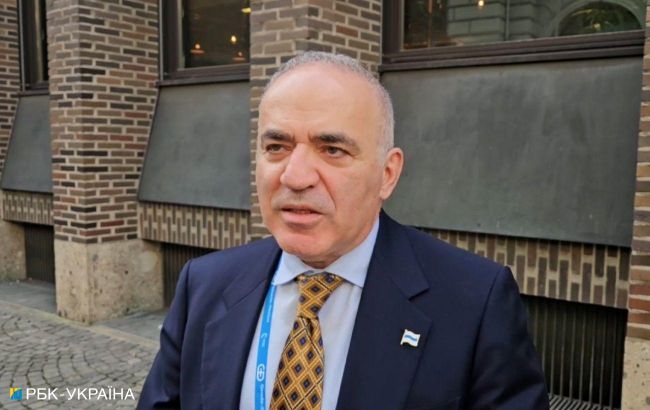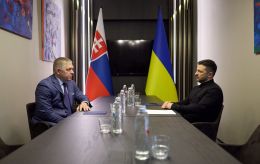Garry Kasparov on Navalny's death: Blood always leads to radicalization
 Garry Kasparov commented on the death of Alexei Navalny (Photo: RBC-Ukraine)
Garry Kasparov commented on the death of Alexei Navalny (Photo: RBC-Ukraine)
Russian opposition figure Garry Kasparov discussed in an interview with RBC-Ukraine the death of Navalny, radicalization in the Russian Federation, and possible protests at the oppositionist's funeral.
In the Russian colony on Friday, February 16, opposition leader Alexei Navalny died, who spent the last three years under arrest due to his political views. RBC-Ukraine met in Munich with former world chess champion and political figure Garry Kasparov. In a blitz interview, he explained what could happen in Russia after Navalny's death and why the question of where the oppositionist will be buried is so important for Putin.
– Garry Kimovich, if the death of Alexei Navalny is confirmed, what consequences will it have, if any, for Russia, for the Russian regime, for Putin, and for the whole world?
– Judging by the reports that are coming in, unfortunately, this tragic news is confirmed. Because trusting what the Russian authorities say would simply be foolish. Whether it's a natural death or somehow accelerated – it is quite obvious that he was being killed slowly.
Regardless of the specific cause of death, the fact that an exhausted person after so many stints in a punishment cell l is sent beyond the Arctic Circle in winter indicates that, let's say, the Putin regime was not very interested in Alexei improving his health. But we cannot exclude that it was a deliberate action. Again, unfortunately, we cannot say anything because everything that happens in Putin's Russia is covered by such a curtain of opacity.
They show us only what they want us to see. We can only guess. Obviously, this death, this tragic news, will shake the West. Suddenly, I found so many messages in my feed: give an interview, talk. But unfortunately, we know that this interest will last for 2-3 days, and then it may fade away again.
I tweeted about President Biden saying that Putin will pay dearly if something happens to Alexei. And in what way will Putin pay for it? Because we have heard these statements so many times, that Putin will pay if he attacks Ukraine. He has already committed so many crimes, and I don't see the West's determination to punish him for these crimes yet.
And the main thing is to understand that as long as he is there, the crimes will not stop. All that we are discussing now is happening against the backdrop of the ongoing war in Ukraine. Putin is increasing pressure. Unfortunately, on the other hand, we see a great variety of words, even at this conference. Instead of words, we need shells. They have a problem with shells, and instead of boasting that the GDP of NATO countries is 25 times or however many times larger than that of Russia and its allies, it is necessary to explain why in this case Russia has 5 times more shells, if not 10 times more.
 Garry Kasparov commented on the death of Alexei Navalny (Photo: RBC-Ukraine)
Garry Kasparov commented on the death of Alexei Navalny (Photo: RBC-Ukraine)
I think that events will unfold, but we cannot say anything because the system of checks and balances in Western society is too fragile today. We don't know what will happen in America. Because the story with the aid package to Ukraine is stuck due to internal squabbles. We don't understand which part is purely related to internal disputes and which, in principle, is related to the most powerful Putin lobby there. Mainly, of course, from the right side, from the Republican side, but it also exists on the left side. So, for now, we can only wait and say once again that the Putin regime is a continuous series of crimes.
If this death is confirmed, and the West must acknowledge the fact that Putin's most prominent opponent, who lives in Russia, has essentially been eliminated, again – in the eyes of the whole world! Is there political will in the West or not? This is also a moment of truth. I would like to believe that there will finally be political will in the West to talk about fundamental changes in Russia, but I would be afraid to bet on it.
– Do you think people who position themselves as the Russian opposition to the Putin regime are being pushed towards more decisive actions? And the same applies to the Russian people. The deaths of hundreds of thousands of soldiers, whom Putin sent to war, essentially did not lead to any real mass protests, and this event – is there a chance that it will bring people to the streets or prompt some other forms of protest?
– It's hard to answer the question definitively because we are dealing with a lot of unknowns.
As for the opposition, I believe that the tragic departure of Alexei from the political arena, because even while in prison, he was still a symbol of struggle, and was a factor that everyone still had to take into account, will inevitably push the opposition towards a more radical side. These are the laws of political struggle, the laws of life. Blood always leads to radicalization. We see how this happened in Ukraine. This process is out of control.
But it is quite obvious that the death of such a person of such magnitude shifts the political construct towards greater radicalism. What will happen in Russia is hard to say. We do not see protests there today, but it is quite obvious that there is hidden dissatisfaction brewing. It is undoubtedly there, we just cannot see it.
– So it's not a burned field? Everyone is scared, some people have been thrown out, some have been imprisoned.
– Yes, everyone is scared, people have been thrown out, imprisoned, killed. But there are 140 million people. We know that there were still 15% against the war for moral reasons. They were there. This is the same Crimean consensus: 86/14. We saw more or less demonstrations in the first two weeks after the full-scale invasion two years ago. So, in fact, this number of people in Russia exists. Some of them left, some were forced to return. But society is not hopeless.
It is quite obvious that today there is no potential for overthrowing the regime even close. There is also no potential for mass protest. But such events can lead to something. Right now, it seems to me, the biggest question that the Kremlin has to solve is where to bury Navalny. In fact, this is the question that they are racking their brains over in the Kremlin.
 Garry Kasparov commented on the death of Alexei Navalny (Photo: RBC-Ukraine)
Garry Kasparov commented on the death of Alexei Navalny (Photo: RBC-Ukraine)
According to their laws, they are obliged to bring him and hand him over to his relatives. That is, as I believe, to his parents in Moscow. But here everything can happen. The point is that these events again are not controlled by anyone. I have no doubt that if such a mournful ceremony takes place in Moscow, we may see a number of people that will exceed all expectations. So, it is not excluded that they will seek other, again illegal, ways.
Navalny's shadow is still a threat. And it is quite obvious that they will continue to fight it even after his death. Regarding both Russia and the West, a new situation has arisen in which everyone will have to make some decisions. Our position remains unchanged: the regime is criminal, but the overthrow of the regime is possible only after the victory of Ukraine. Ukraine's victory is a step towards freedom for Russia. Therefore, nothing has changed in my position and that of my colleagues here. Another thing is that this tragic news may increase the number of our supporters.
– You once sharply criticized the methods of Alexei Navalny. But now, if these reports are true, in your opinion, how will Alexei Navalny go down in history as in Russia, and how significant will his place in this history be?
– We do not know how our affairs will resonate in history. I had significant differences with Alexei on many issues, although we also acted together, and many years ago, when I was still in Russia, we participated in large demonstrations together.
All this criticism today becomes insignificant against the backdrop of this tragedy. A person has died, realizing the risk he was taking by returning to Russia. When I was asked if I could comment on his decision to return after an unsuccessful attempt by the Putin regime to eliminate him, I always talked about the political component of the decision. And I may not agree with it.
It seems to me it was not the best decision. But one cannot comment on an act of heroism. An act of personal heroism stands above any political calculations. Navalny took a risk. He paid the highest price for it – his life. Therefore, it seems to me that today the rest of the critical arrows that were launched at Navalny simply do not reach the target.
He is already above all this criticism. And I want to repeat that even Navalny's shadow is a terrible threat to the regime. It is something the regime may or may not be able to handle because he is already out of their control. But what he has provoked with his life and his death may be the final straw that overflows this cup of the world's patience with Putin's crimes.

